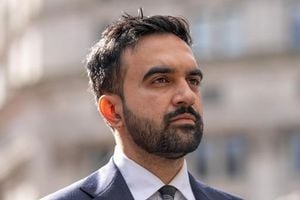The new Labour government’s proposal to impose VAT on private school fees has stirred controversy as it gears up for implementation starting January 2025. Critics argue this move will create havoc and unfairly impact families relying on private education, especially those with children having special educational needs.
Families are now faced with increasing pressure as Amanda Quinn, whose daughter Addison needs specialized educational support, becomes the face of this growing unrest. "With the increase of fees due to VAT, we’re not sure we can afford to keep her enrolled,” Alexis stated. The plans to scrap VAT exemptions and business rate relief stem from Labour’s aim to redirect funds to hire 6,500 new teachers for state schools. But for parents like Quinn, these schemes may be coming at too higher cost.
Labour’s Education Secretary, Bridget Phillipson, has defended the policy as necessary to boost funding for state schools. According to her, "We are working to build up our public services and education system by ensuring everyone contributes fairly." Her words haven’t quelled concerns among educational bodies and parents alike.
Currently, nearly 111,000 students with special educational needs and disabilities (SEND) are educated privately; unfortunately, only about 8,000 have education health care plans (EHCP). These plans are supposed to outline how children’s educational needs will be met. Unfortunately, for Addison, the local council denied her access to such support. Quinn remarked about the frustration and helplessness, saying, "All I wanted was to provide her with a fair chance to succeed." The financial burden is compounded by the lack of suitable state school options, which raises the stakes even higher for families already managing tight budgets.
Quinn's struggle highlights the stark reality many families face as they opt for private schooling, often out of desperation when state provisions fall short. "At my daughter’s prior school, all the noise was overwhelming for her, making basic learning so hard. We were forced to choose private school to escape this chaos,” shared Alexis. Now, with potential VAT implementation, even this option feels at risk.
Voices of dissent are echoing through the halls of teaching unions and educational institutions, with the NASUWT stating, "Imposing VAT at the start of the school year simply lacks foresight." They cite the difficulty this timing presents, voicing concerns over the policy’s alignment with current school funding problems, which they believe are being addressed at the expense of private school students.
Francis Green, Professor of Work and Education Economics at University College London, noted, "Many more state school parents are struggling to afford basic educational needs. Redirecting funds to the state school sector isn’t just the moral thing to do, but also economically viable." While his statements are meant to support the public education system, teachers and parents feel the VAT effects might harm private institutions, particularly smaller schools not operating on profit.
At St. Joseph's Preparatory School, its Headteacher, Daniel Hood, has announced the impending closure of the establishment due to the increased financial burden brought on by the new policy. "We cater to families who need us. This policy will not only force many smaller institutions like ours to shut down, but students will also lose valuable support systems. It’s anything but fair," said Hood, emphasizing his commitment to his students over profits.
The potential ramifications of this change could ripple throughout the educational system. Reports speculate conservative constituencies might experience twice as many school place shortages as Labour’s VAT on private schools takes hold, adding another layer of concern over managing educational resources.
Parents have been vocal about the ramifications of the shift. With the looming threat of increased education costs, many families fear they will be forced back to state schools. Speaking on behalf of the National Association of Head Teachers, one principal expressed worry, stating, "This transition adds chaos amid an already strained system. The real need is to strengthen all schools, not just shift the financial burden from one group to another."
Across the debate, proponents argue the extra funding for state schools is much needed, especially as more private institutions opt for higher fees to absorb the tax changes. Yet this conflict between supporting public services and the immediate fallout on private education is taking center stage, and many wonder where the compromise lies.
Adding fuel to the fire, the criticism toward Phillipson for her remarks about private schools’ perceived lavishness has elicited backlash. The minister’s comment about private establishments using "embossed stationery" as indicative of elitism sparked debates about snobbery and class struggle engulfing the educational framework.
Despite its intentions, Labour’s policy appears to have torn apart the delicate fabric of educational balance. Special educational needs advocacy groups remind society of the importance of adequate support for all school types. The NHS and other state services have been called upon to provide fair funding without diverting resources meant for vulnerable students. Amidst these tensions, educational alliances are pushing for policies and frameworks to best serve deprived communities without isolative approaches.
The debate continues around how Labour's VAT plan impacts educational equity and accessibility. With each passing day until the scheduled January start, the growing number of advocates like Quinn brings more urgency and emotion to the matter. For families caught between falling short on educational quality and financial feasibility, every step taken might change their child’s future.
With time running out, the future of small private schools remains precarious, and the cries for regulations and support are growing louder. Families, educators, and advocates alike stand on the front lines, ready to alter the course of education and demand equality for every child across the spectrum, hoping their calls do not fall on deaf ears as policies take shape without regards to those who will be most affected by them.



